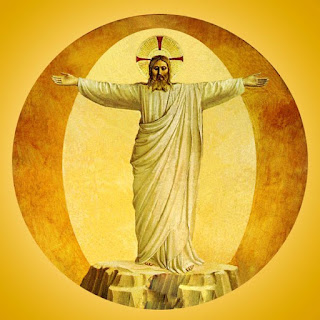Holy Week, Good Friday
John 19: 1-15
 |
| Tissot |
And again, Pilate went out to them and said, “Behold, thus I bring him out to you, so that you may know that I find no guilt in him.
And Jesus came out, wearing the crown of thorns and the purple cloak. And Pilate said to them, “Behold, the man!” [Behold, this is Man!]
When the chief priests and the Temple attendants saw him, they shouted, “Crucify him, crucify him!”
Then Pilate said, “Take him yourselves and crucify him, for I find no guilt in him.”
Then the Jewish leaders replied, “We have a law, and according to that law he must die, because he has made himself a Son of God.”
When Pilate heard these words, he was even more alarmed, and again he went into the courthouse and said to Jesus, “From where have you received your mission?” But Jesus gave him no answer.
Then Pilate said to him, “You will not speak with me? Do you not know that I have the power to release you and also to crucify you?”
Jesus answered, “You would not have power over me unless it had been given to you on high. Therefore, the greater burden of destiny falls upon him who handed me over to you.”
From then on, Pilate tried to set him free. But the people shouted, “If you release him, you are no longer a friend of Caesar, for everyone who makes himself a king is against Caesar.”
When he heard these words, Pilate led Jesus out, and sat down on the judgment seat in the place called the Pavement, in Hebrew Gabbatha. I was the day of the preparation of the Passover Festival, about midday. And he said to the people, “Behold, this is your King.” But they shouted, “Away with him, away with him, crucify him!”
Pilate asked them, “Shall I crucify your King?”
And the chief priests answered, “We have no king but Caesar!”
Holy Week, Good Friday
April 14, 2017
John 19: 1-15
 |
| Salvador Dali |
It is as though, having gone as deeply as he can, he crosses the null-point, a threshold into the very realm of creative life. His pure life's blood seeps into the earth. His strong spirit-life is breathed out into the atmosphere. And then his body, bones unbroken, wrapped in its own weight of healing herbs, is given over to the earth. He continues his descent, into the earth's blood, its rivers, into its bones, the minerals. The earth becomes his new body.
The gospel hints at a tender process that continues after His death, for it says that the tomb, cut out of the rock, is new, fresh. And the tomb lies in a garden.
 |
| Bernhard Eyb |
In the funeral service of The Christian Community, Christ says, I am the new birth in death. I am life in dying. Through him, because of him, with him, we, too, can remain alive when crossing through the gateway of death.
Visit our website!
Visit our website!















